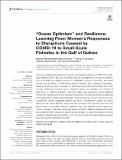"Ocean Optimism" and resilience : learning from women's responses to disruptions caused by COVID-19 to small-scale fisheries in the Gulf of Guinea
Abstract
This study examines the response of women to disruptions caused by COVID-19 in small-scale fisheries (SSF) in the Gulf of Guinea (GOG). It interrogates the concept of resilience and its potential for mitigating women’s vulnerability in times of adversity. We define resilience as the ability to thrive amidst shocks, stresses, and unforeseen disruptions. Drawing on a focus group discussion, in-depth interviews with key informants from Cote d’Ivoire, Ghana and Nigeria, and a literature review, we highlight how COVID-19 disruptions on seafood demand, distribution, labour and production acutely affected women and heightened their pre-existing vulnerabilities. Women responded by deploying both negative and positive coping strategies. We argue that the concept of resilience often romanticises women navigating adversity as having ‘supernatural’ abilities to endure disruptions and takes attention away from the sources of their adversity and from the governments' concomitant failures to address them. Our analysis shows reasons for “ocean optimism” while also cautioning against simplistic resilience assessments when discussing the hidden dangers of select coping strategies, including the adoption of digital solutions and livelihood diversification, which are often constructed along highly gendered lines with unevenly distributed benefits.
Citation
Okafor-Yarwood , I , van den Berg , S , Collins , Y A & Sefa-Nyarko , C 2022 , ' "Ocean Optimism" and resilience : learning from women's responses to disruptions caused by COVID-19 to small-scale fisheries in the Gulf of Guinea ' , Frontiers in Marine Science , vol. 9 , 862780 . https://doi.org/10.3389/fmars.2022.862780
Publication
Frontiers in Marine Science
Status
Peer reviewed
ISSN
2296-7745Type
Journal article
Description
The University of St Andrews Restarting Research Funding Scheme (SARRF) is funded through the SFC grant reference SFC/AN/08/020. The University of St Andrews Institutional Open Access Fund (IOAF) is acknowledged for open access support.Collections
Items in the St Andrews Research Repository are protected by copyright, with all rights reserved, unless otherwise indicated.

